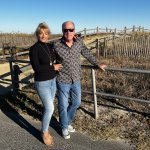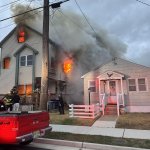WEST CAPE MAY – Two local donors to Animal Outreach of Cape May County are looking for answers. They want to know if their donations, and others’ donations to the Animal Outreach Building Fund, will ever be used; if so when? If not, what will happen to the funds raised for this purpose?
“I see myself as a representative for the community of hundreds, if not thousands of people who have donated to the Animal Outreach Building Fund,” said Joan D’Avanzo, a Cape May Point artist, who contacted the Herald for help in learning what the organization intends.
In a letter from 2005 to the then Animal Outreach board president, D’Avanzo’s husband, Robert, indicated they had held “fundraising parties at their home, solicited donations from family, friends and neighbors,” and donated their own funds.
He said Joan had donated more than $10,000 from sale of her artwork, and the couple had donated $5,000 in 2001.
“We have the right to know, after 15 years, what the status is on the land and the shelter,” she continued. “If the land is up for sale, or going to be sold, how will the proceeds be used? Animal Outreach should make this information public, via a venue such as the Herald, and finally put this to rest. Let us know the plans.”
When contacted by the Herald, Animal Outreach Board of Trustees Treasurer Cindy Huf, Cold Spring, said, “It’s a long story, but we are committed to financial accountability and stewardship of the funds that have been donated to us. We want to make sure we are meeting the needs of the community.”
She indicated the non-profit organization has over $160,000 in land and cash assets earmarked for a new facility, which was the board’s dream nearly 10 years ago.
Today, its mission remains the same, helping abused, abandoned and neglected animals from across the county as a no-kill facility, but the needs of the community are different. The small group of volunteers is trying to determine what makes sense as a result.
“We have not abandoned the idea of one day building the shelter,” a statement from the board read, “but our recent focus has been on increasing the success of our new storefront shelter and Adoption Center. It is important that we remain focused on addressing the problem of homelessness and that we stay flexible in the way we best address that issue.
“Right now, we are planning to sell the land that we own in Lower Township,” the statement continued. “The lesson we learned about the visibility of our current location, along with the overwhelming hurdles associated with that particular property, has led us to the decision to sell that parcel.”
Small, Caring Group
In 1998, a small group formed Animal Outreach of Cape May County, Inc. Its initial purpose was to take over and operate the existing shelter that was located in Lower Township.
According to the organization’s website, “The facility was rundown and presented a huge challenge, but the group was dedicated to improving the lot of the homeless animals it housed. Many volunteers joined, cleaning, walking dogs, painting, washing dishes, training and generally working together to improve the place.”
A few years later the property was sold to a developer, and Animal Outreach was itself rendered homeless. They were approached by the Cape May Animal Control Officer John Queenan to form an alliance. Animal Outreach took over the existing trailer used by the city and added another as an Adoption Facility for those cats that were deemed adoptable, intent on finding homes for abandoned pets that would otherwise be destroyed.
“Sadly, on May 18, 2007, a tragic fire claimed the trailers and all 37 inhabitants,” the website noted. “It was devastating for the staff, board members and volunteers who had cared for the cats on a daily basis. The board met and decided that Animal Outreach would continue the mission out of respect for those lost in the fire as much as for the ongoing great need in the community.”
Huf said during those early years, the county animal shelter had not yet been built, but eventually a “fabulous facility was built” about 2004.
Although she wasn’t on the board at the time, having joined about 2009, Huf said that today the West Cape May group works closely with the county organization to provide about 100 adoptions a year, with more animals in foster care that can’t be adopted “because of their special needs.”
Costs Exceeded Expectations
Fundraising for a new shelter began, and the Animal Outreach board purchased 3.45 acres of land at 3000 Bayshore Road in Lower Township where they planned to eventually build the shelter. This land had a sign indicating “Future Home of…” but was recently blown over by the wind, according to Huf.
“We had a pro bono architect draw up some plans for us, but he couldn’t come in with anything affordable,” Huf explained. “Then another one came in pro bono and developed plans that we all thought were reasonable. We went out for bids about three years ago and the bids weren’t even close to what we expected; we were devasted.”
“With estimates at nearly $1 million or more, the cost far exceeded what we could expect the community to support through private donations,” the board statement said. “We had potential support from the USDA, but, unfortunately, that help would have been by way of a loan that needed to be repaid with interest.”
Part of the prohibitive cost, Huf noted, was due to the land itself, which she described as “lacking utilities with environmental issues at the time. The environmental issues have been taken care of,” she added.
A Silver Lining
“In the meantime, the county shelter is functionally well, but it is still over-crowded,” she said. “We decided to open the adoption shelter three years ago and get our feet wet to see how it would work. The silver lining is that it did work.”
The facility, at 600 Park Blvd., West Cape May, is a “warm, nice, little cozy place,” Huf said. “You can see the cats in the window. If we were on Bayshore, I’m not sure our success rate would be so high. The facility would have been more like a shelter rather than this nice, cozy place.”
The funds raised for the new building – now about $163,000 in land and cash assets – is in a separate fund from the organization’s operating fund.
“If funds are raised and earmarked by the donor for a specific purpose, then we are bound to use it for that purpose,” Huf explained.
“If the purpose changes, then the organization needs to go back to those donors to explain what happened, and find out if the donor wants their money used for the new purpose or returned. It’s a huge undertaking, but we have no choice.”
According to Shelley Van Dyke, Animal Outreach board president, “The money is there, untouched and we want the public to know that our records are open to anyone. People can even ask for it back today if they want it.”
Reevaluating Plans
Currently, the board is re-evaluating the needs of the community, Huf said. “At the time we planned the new facility, there wasn’t a county facility. If we can continue helping the county with our adoption center in a visible location and help the over-crowding situation, then that’s what we will do. We are trying to do what makes sense, but we are a small group of part-time volunteers and things always don’t move as fast as one might like.”
The board has decided to sell the land on Bayshore, and because of negotiations underway now with a potential buyer, Huf and Van Dyke declined to elaborate.
“Sometimes it takes a long time for something to sell, but once the property sells, then the board will have an opportunity to look at other options,” Van Dyke noted. She is a realtor in Wildwood Crest.
“We have not abandoned the idea of building a shelter, and we are hoping to expand,” she continued. “But we are a small group of people with a skeleton crew trying to serve needs of the animals first. Our main goal is to care for the animals and I think we’ve been successful at that.”
Balancing Mission, Funding
“It’s been really encouraging to see the community events supporting us over the past few years, and we are especially grateful,” Van Dyke added. “We are doing all we can to be sure we are caring for the animals.”
The West Cape May facility has an operating budget of about $100,000 per year, according to Huf, to cover the cost of one paid staff member, the rent and utilities, and veterinarian care, which typically is the biggest expense.
“We have tried to lower our costs by changing the ratio of healthy to unhealthy and adoptable animals,” Huf noted. “It’s a balance because some people say it’s all about the mission, but without the funding, we won’t have a mission.”
About 25 cats are cared for at any one time in the facility, and about 10 dogs are in foster care at any one time. Potential adopters are screened, sometimes including a home visit, according to Huf. “The cost to adopt a kitten is about $75, which helps defray some of the costs of shots and spaying or neutering. Older cats cost less.”
“We are a small staff, so sometimes things don’t happen as quickly as one would like,” VanDyke acknowledged, including communications about a new facility.
The director who handled communications previously has left the area so volunteers are trying to focus communication efforts on something a little more manageable, such as Facebook. Their contact list has been updated so it also is ready for any mailings.
“We are pleased with the community support that we have received and continue to receive,” Huf said. “We’d like to see more visitors come to our center to see what a positive space it is.”
“We are extremely grateful for every dollar given to the organization and we’re dedicated to using those donations responsibly,” Van Dyke noted.
The group works under the auspices of independent bookkeeping and accounting firms to manage its interactions and ensure accountability.
They said they are in “good standing” with the New Jersey Department of Consumer Affairs, Charitable Registration Section, and current with all tax filings. The latest IRS 990 form can be found at their website http://aocmc.org/aboutus.html.
To contact Karen Knight, email kknight@cmcherald.com.
Del Haven – Timothy Snyder, award winning historian, author, and professor, explains that destroying a country requires undermining five key zones: "health, law, administration, defense, and intelligence….








